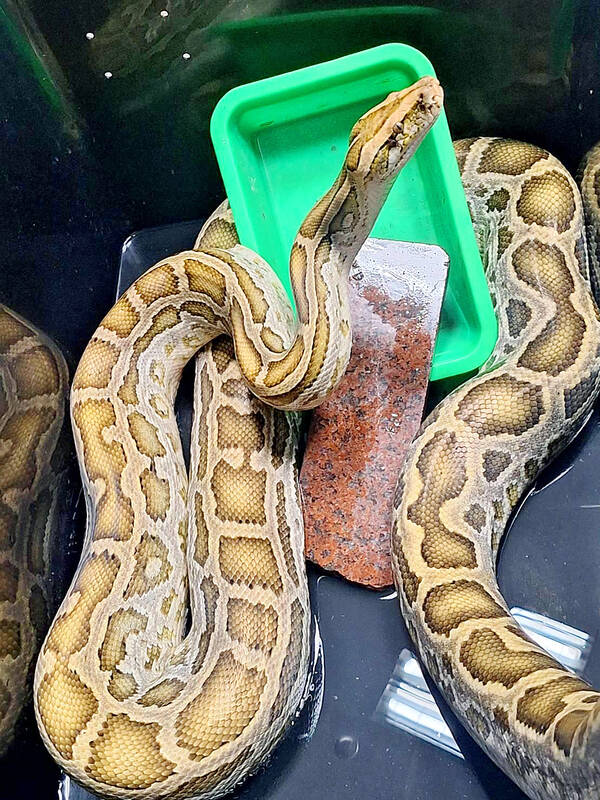The Ministry of Agriculture yesterday said it is planning to ban the ownership or importation of 955 more animals, including racoons and alligator snapping turtles.
The Department of Animal Welfare in a meeting on Friday discussed amendments to the ministry’s List of Animals Banned from Being Owned, Imported or Exported, with the goal of adding more species to it.
The department said the addition of 955 animals to the list was based on three major considerations.

Photo courtesy of the Animal Disease Control Center of Changhua County
First, priority was given to animals that were not included in the Schedule of Protected Species as specified in Article 4 of the Act on Wildlife Conservation (野生動物保育法).
Second, species that were regulated in other countries but had no records of formal imports to Taiwan were pre-emptively added to the list.
Third, species carrying deadly venom or posing public safety risks — causing death, serious injuries or great pain — were also included.
Animals banned from import or ownership include the spectacled caiman, all species of the Dasypodidae family, Castor genus and Canidae family, except for domestic dogs, the department said.
Animals banned from ownership include eight categories, such as Burmese pythons, raccoons, and all species of the Chelydridae family, it added.
The Taiwan Amphibian and Reptile Association on Saturday in a Facebook post said that the 955 added species were decided by the Industrial Technology Research Institute.
“An agricultural policy formulated by an agricultural agency was entrusted to an industrial research institute for evaluation, instead of an institution specializing in wildlife and unusual and eccentric pets, and the agency adopted its evaluation results. This approach is unacceptable,” it said.
While many species were banned due to public safety risks or animal welfare issues, the department could prohibit almost all species from ownership if animal welfare is its main concern, it said.
“All people or entities owning amphibians or reptiles as eccentric pets might be accused of abusing animals and infringing animal rights,” it added.
The policy might not be effectively implemented, as local governments’ animal welfare units do not have enough workers to identify the 955 additions and to accommodate the captured animals, it said.
National Taiwan Normal University Department of Life Science professor Lin Si-min (林思民) said the listed species were certain to be risky, but keeping cats or dogs as pets also involves risks.
The point is to manage the risks and educate the owners, he said.
If the ministry’s policy develops into comprehensive prohibition, such ownership might be forced underground while the problem remains, Lin said, calling for enhanced risk management and owner education instead.
Department of Animal Welfare Director Chiang Wen-chuan (江文全) said the list and the implementation date are being discussed, and not all 955 species would immediately be banned.
The final decision on pet ownership bans would be based on the greatest possible common ground, which would be identified through meetings and discussion, he said.

Right-wing political scientist Laura Fernandez on Sunday won Costa Rica’s presidential election by a landslide, after promising to crack down on rising violence linked to the cocaine trade. Fernandez’s nearest rival, economist Alvaro Ramos, conceded defeat as results showed the ruling party far exceeding the threshold of 40 percent needed to avoid a runoff. With 94 percent of polling stations counted, the political heir of outgoing Costa Rican President Rodrigo Chaves had captured 48.3 percent of the vote compared with Ramos’ 33.4 percent, the Supreme Electoral Tribunal said. As soon as the first results were announced, members of Fernandez’s Sovereign People’s Party

EMERGING FIELDS: The Chinese president said that the two countries would explore cooperation in green technology, the digital economy and artificial intelligence Chinese President Xi Jinping (習近平) yesterday called for an “equal and orderly multipolar world” in the face of “unilateral bullying,” in an apparent jab at the US. Xi was speaking during talks in Beijing with Uruguayan President Yamandu Orsi, the first South American leader to visit China since US special forces captured then-Venezuelan president Nicolas Maduro last month — an operation that Beijing condemned as a violation of sovereignty. Orsi follows a slew of leaders to have visited China seeking to boost ties with the world’s second-largest economy to hedge against US President Donald Trump’s increasingly unpredictable administration. “The international situation is fraught

MORE RESPONSIBILITY: Draftees would be expected to fight alongside professional soldiers, likely requiring the transformation of some training brigades into combat units The armed forces are to start incorporating new conscripts into combined arms brigades this year to enhance combat readiness, the Executive Yuan’s latest policy report said. The new policy would affect Taiwanese men entering the military for their compulsory service, which was extended to one year under reforms by then-president Tsai Ing-wen (蔡英文) in 2022. The conscripts would be trained to operate machine guns, uncrewed aerial vehicles, anti-tank guided missile launchers and Stinger air defense systems, the report said, adding that the basic training would be lengthened to eight weeks. After basic training, conscripts would be sorted into infantry battalions that would take

GROWING AMBITIONS: The scale and tempo of the operations show that the Strait has become the core theater for China to expand its security interests, the report said Chinese military aircraft incursions around Taiwan have surged nearly 15-fold over the past five years, according to a report released yesterday by the Democratic Progressive Party’s (DPP) Department of China Affairs. Sorties in the Taiwan Strait were previously irregular, totaling 380 in 2020, but have since evolved into routine operations, the report showed. “This demonstrates that the Taiwan Strait has become both the starting point and testing ground for Beijing’s expansionist ambitions,” it said. Driven by military expansionism, China is systematically pursuing actions aimed at altering the regional “status quo,” the department said, adding that Taiwan represents the most critical link in China’s